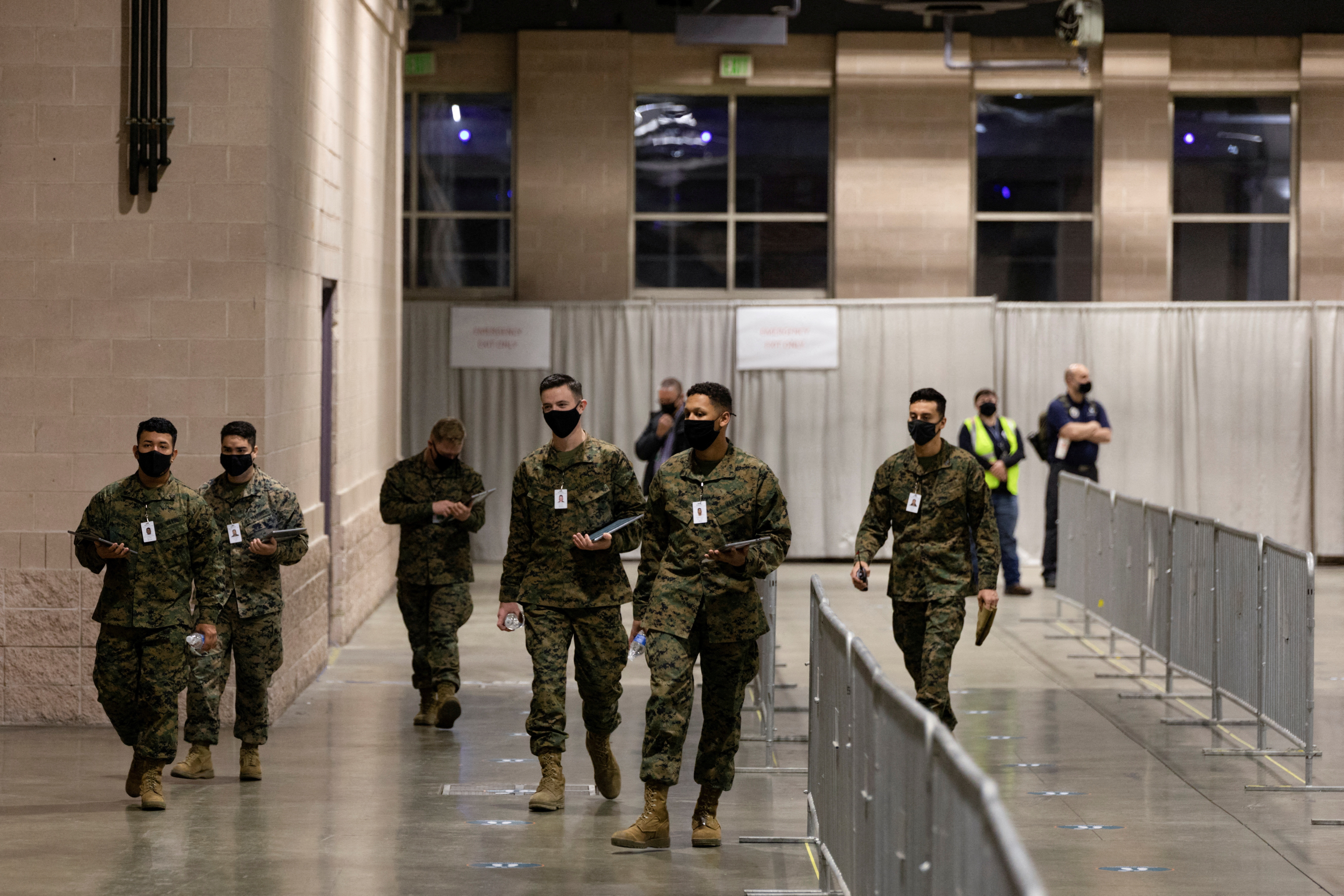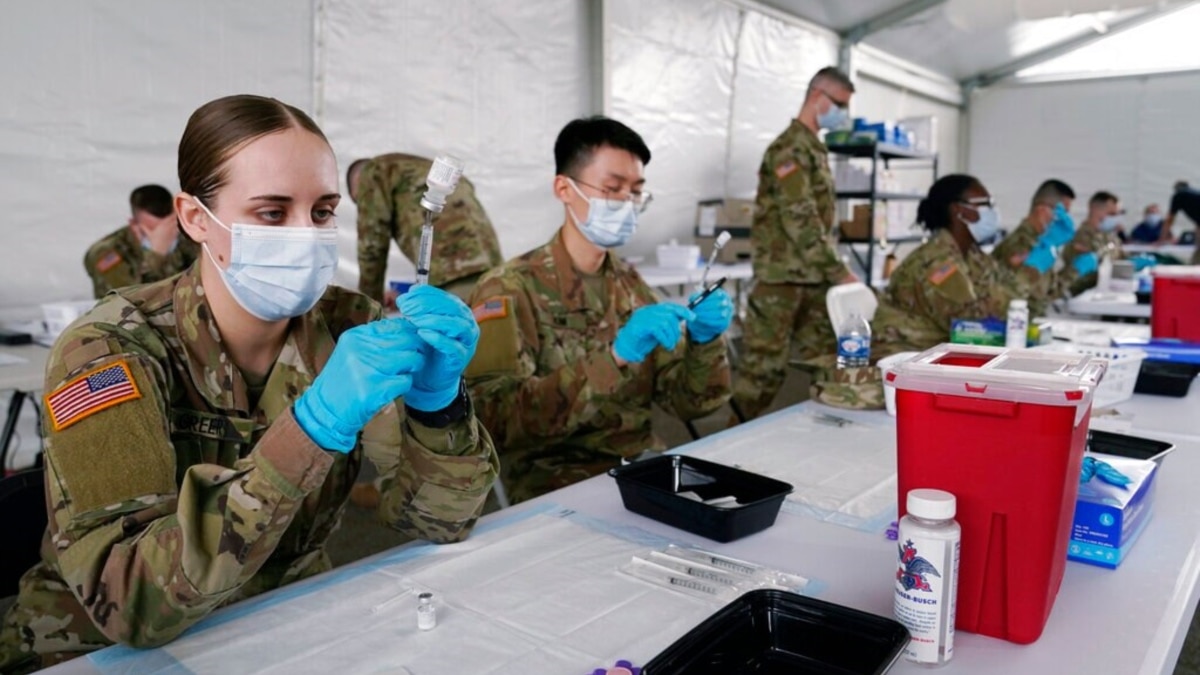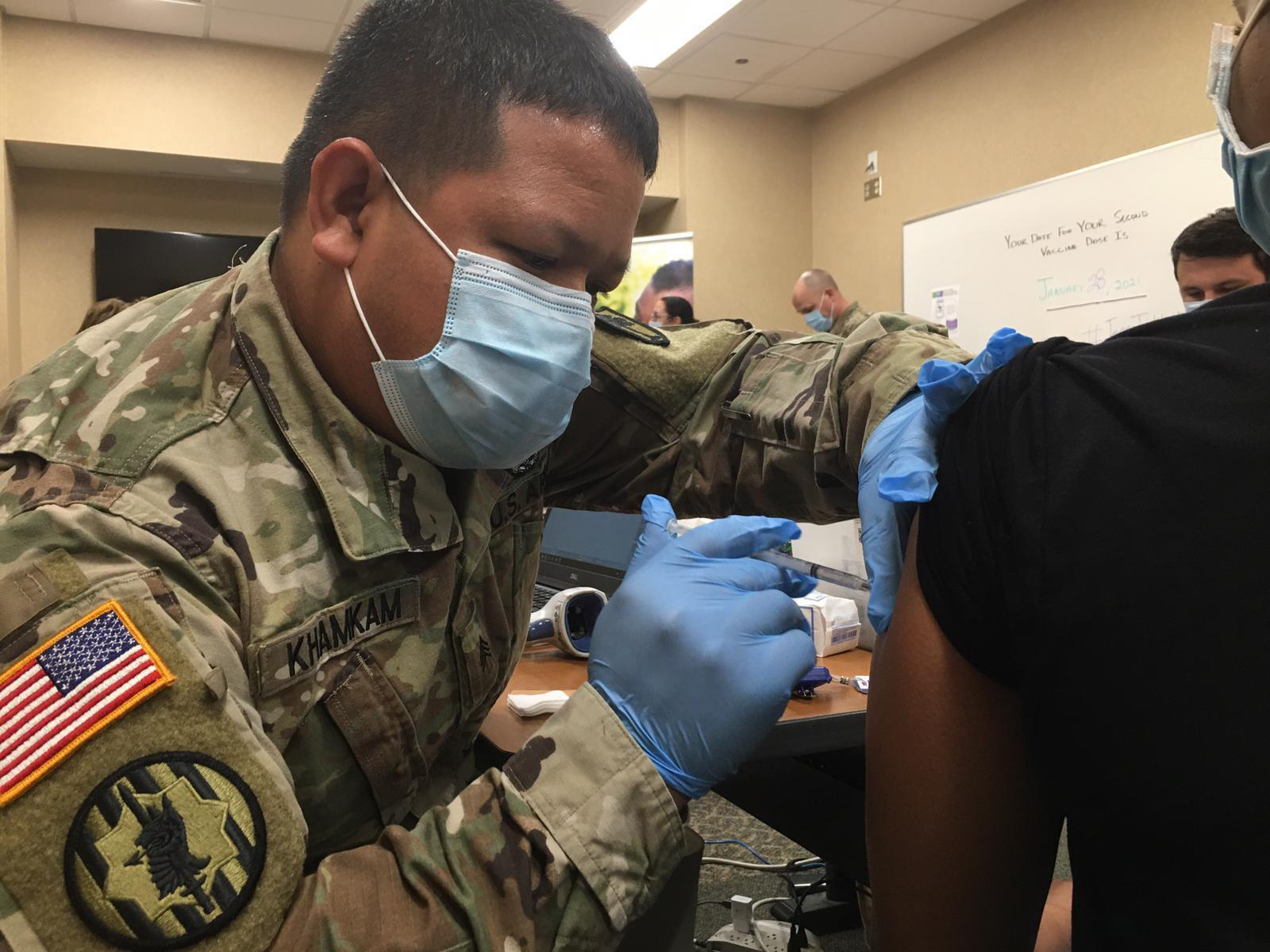Vaccine Military - U.S. Spc. Eyza Carrasco, left, with the 2nd Cavalry Regiment, is vaccinated against COVID-19 at the 7th Training Command (7ATC) Rose Barracks, Vilseck, Germany, May 3, 2021. The US Health Clinic in Grafenwoehr and Vilseck is conducting "One Community " The COVID-19 Vaccine 19 runs May 3-7 to provide thousands of appointments to the 7ATC community of Soldiers, spouses, civil servants, veterans and local residents employed by the US. (Photo credit: US photo by Markus Rauchenberger) REAL VIEW
WASHINGTON - A new vaccine for COVID-19 will be available to the Army as an alternative to the recently announced Pfizer-BioNTech vaccines, Moderna and Johnson & Johnson's Janssen.
Vaccine Military

"With the discovery of the NOVAVAX vaccine, we are excited to have another tool to help prevent the spread of COVID-19," said Lt. Gen. R. Scott Dingle, Surgeon General and commander of the US Medical Command.
Navy, Marine Corps Issue Policy, Deadlines For Mandatory Covid 19 Vaccinations For Active, Reserve Forces
The US Food and Drug Administration issued an emergency use authorization on July 13, 2022 for the Novavax COVID-19 Vaccine, to prevent COVID-19 caused by severe acute respiratory syndrome 2 (SARS-CoV-2) in people 18 years of age. of age. old and old.
"The Novavax vaccine is called a 'recombinant protein vaccine.' This type of vaccine has been in use since the 1980s. Other recombinant protein vaccines include herpes, hepatitis B, and human papillomavirus vaccines," Dingle said.
Novavax offers an option for completely unvaccinated Soldiers and uses a different technology than mRNA and viral vector vaccination options. Dr. Steven Cersovsky, Deputy Director of the Center for Public Health, said Novavax works like a traditional vaccine.
"In a more 'traditional' injection, like Novavax, the injection gives your body part of the virus: in this case, it gives you a protein, the spike protein," Cersovsky said. "And it allows your body to generate an immune response to that protein."
The Overlooked Logistics Of Covid 19 Vaccine Distribution
Novavax, a two-dose vaccine with no recommended booster, has been widely used in Europe since early 2022 and has proven to be as effective as other vaccines in preventing severe illness, hospitalization and death from coronavirus infection, Cersovsky said. .
Soldiers who voluntarily choose to receive Novavax will be considered compliant with the DOD COVID-19 vaccination mandate.
"This policy, as part of all recommended policies, supports the goal of maintaining an adequate and appropriate health workforce and healthy Soldiers, citizens and families," said Dingle.

"Soldiers have options and can consult [with] healthcare providers about the medical field, and they have the opportunity to consult [with] clergy about religious aspects," said Lt. Colonel William Martin, chaplain and chief of religious and moral accommodation in the Office of the Chief of Staff. "It is a matter of religion that affects medical reality; it is really the advice of the team here to provide the Soldiers with the best information so that, in accordance with their sincere religious beliefs, they can make the best decisions.
Advocates Worry Military Vaccine Challenges Could Jeopardize Other Religious Freedom Cases
Commanders and medical professionals are given information about Novavax; If Soldiers are interested in more information to see if Novavax is right for them, they can contact their commanders, chaplains or medical professionals.
"Our priority is protecting the health and well-being of our greatest assets - our Soldiers, family members and citizens," Dingle said. "We will continue to ensure that our employees have the most accurate information about the preventive measures that can be taken to reduce the spread of COVID-19." The US Department of Defense (DOD) is in the final stages of a highly effective COVID-19 response. vaccination campaign, but a small percentage of service members are reluctant to get the vaccine. As the effort enters its second year, military planners and policymakers must consider the nature of this reluctance to improve US military preparedness for global health emergencies and similar emergencies.
In December 2020, when the first COVID-19 vaccine met the US Food and Drug Administration's (FDA) criteria for emergency use approval, the DOD implemented a combined vaccine program. Military health care professionals, service members responsible for critical national capabilities or preparing for deployment overseas, and individuals with high health risks are given priority. Although the department encourages all members to get vaccinated, doing so is voluntary until the FDA issues full approval.
For more than eight months of the campaign, including during changes between presidential administrations, the DOD's policy on vaccination against COVID-19 was the same. In August 2021, however, when the FDA fully approved the first vaccine for COVID-19, the DOD ordered that all active duty and Ready Reserve members of the Armed Forces be vaccinated.
Factbox: Countries Making Covid 19 Vaccines Mandatory
A weekly digest of the latest from the week's major foreign policy issues, including summaries, opinions, and explanations. Every Friday.
Editing of original analysis, data visualization, and commentary, examining debates and efforts to improve health around the world.
By entering your email and clicking subscribe, you agree to receive announcements about our products and services, as well as invitations to events. You also agree to our Privacy Policy and Terms of Use.
The DOD has authorized all military services — the US Air Force, Army, Navy, Marine Corps, and Space Force — to carry out the order as each sees fit, but outlined an "ambitious timeline for implementation." The service then set a unique vaccination deadline for its components, beginning in early November 2021 for active-duty airmen and ending in mid-December for reserve and marine sailors. The only exit date is June 30, 2022, for members of the Armed Forces, due to compelling structure and scheduling challenges.
Army Is Discharging Anti Vaxxers 'immediately'
By December 2021, more than 97 percent of the nearly 1.4 million workforce was immunized. About half of unvaccinated active-duty service members have submitted requests for exemptions or accommodations, which are pending. Members can claim medical or administrative exemptions or religious accommodations, but so far only medical and administrative exemptions are allowed by any service.
Recently, the US Air Force became the first service to exempt members who refused to be vaccinated. The US Marine Corps released 103 members soon after. The US Army and Navy are also planning to discharge members who refuse the policy. However, the number of service members who refuse to vaccinate will not increase, as recruits are now required to agree to and comply with the vaccination mandate as a requirement to join the military.
Younger, younger service members are more likely to refuse vaccines. For example, all twenty-seven new airmen released by the Air Force had less than six years of military experience. The trend is consistent with an April 2021 analysis of vaccination hesitancy among military members by the DOD Defense Health Agency. The study also found that among all active duty military, "Non-Hispanic Black service members were 28 percent more likely to have started vaccinations." Additionally, in the first three months of the DOD vaccination campaign, female service members were 10 percent less likely to initiate vaccination than their male counterparts. Factors associated with higher vaccination rates include age, level of education, and seniority.
Limited reluctance to vaccinate the military is driven by many of the same factors that affect civilians. The first and most important factor driving military vaccination skepticism is misinformation, as some DOD leaders have acknowledged. This is consistent with the assessment of skepticism among the general public, but it does not fully take into account demographic differences, which, as the DOD has found in studies, are influenced by other "social factors".
Dod Health System Archives Covid 19 Vaccination Data > U.s. Department Of Defense > Defense Department News
Second, policy-skeptic military members express distrust of public institutions, both military and non-military, although to a lesser degree than the public. This mistrust is often deep, built on various historical factors, making it harder to overcome than misinformation. While institutions can directly combat misinformation through outreach and education, restoring trust requires a long and comprehensive approach. Continued efforts to build trust over time may reduce vaccination disparities between non-Hispanic Black service members and minority service members.
Personalization of risk is a third important factor among military members who are hesitant to get vaccinated, especially young ones. Ultimately, a person's decision to get vaccinated depends on how they perceive the risks of getting vaccinated versus the risks of not getting vaccinated. For example, in the late 1990s and early 2000s, the military required service members to receive the anthrax vaccine. Unlike the COVID-19 vaccine, the anthrax vaccine is not widely distributed outside the military. Refusing service members—many of whom receive many of the required vaccinations in the course of their careers—said the reported side effects weigh heavily on them.
In the case of COVID-19, low risk perceptions of the young and healthy appear to have the same effect. This risk assessment, however, can change quickly. For example, consider an anecdote from an Air Force unit: One of the highest vaccination increases in this unit occurred when assigned members were preparing to close a US medical facility at Bagram Air Base in Afghanistan. There's nothing like the closing of the only accessible hospital within thousands of miles to change the risk assessment.

One of the factors associated with reluctance to vaccinate outside the military is political affiliation, and some think that affiliation affects service vaccination decisions.
Covid 19 Vaccine Hesitancy In The Military Is A Manageable Challenge
Military vaccine list, adenovirus vaccine military, plague vaccine military, military vaccine records, flublok vaccine, prevnar vaccine, ipd vaccine, fluzone vaccine, military hpv vaccine, military vaccine, smallpox vaccine military, military vaccine agency

0 Comments